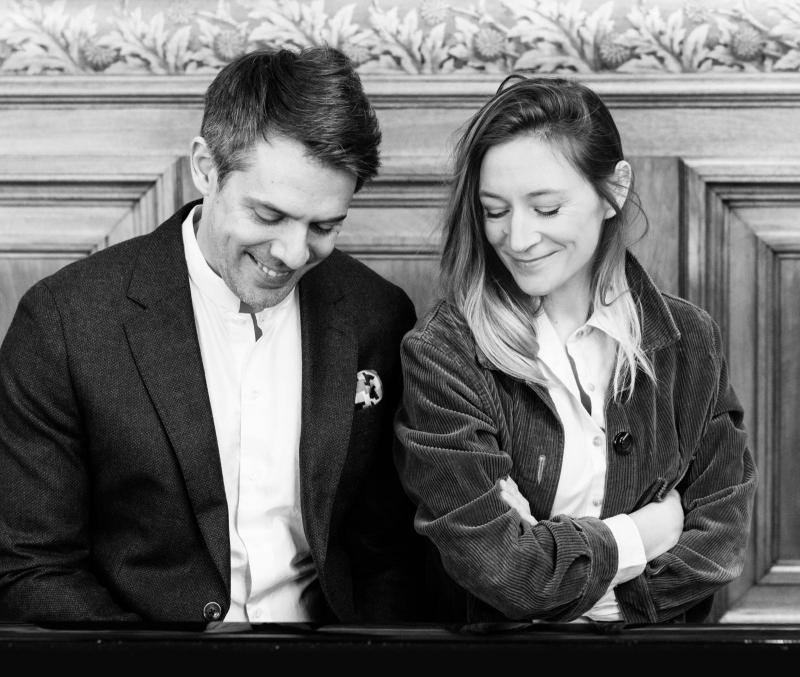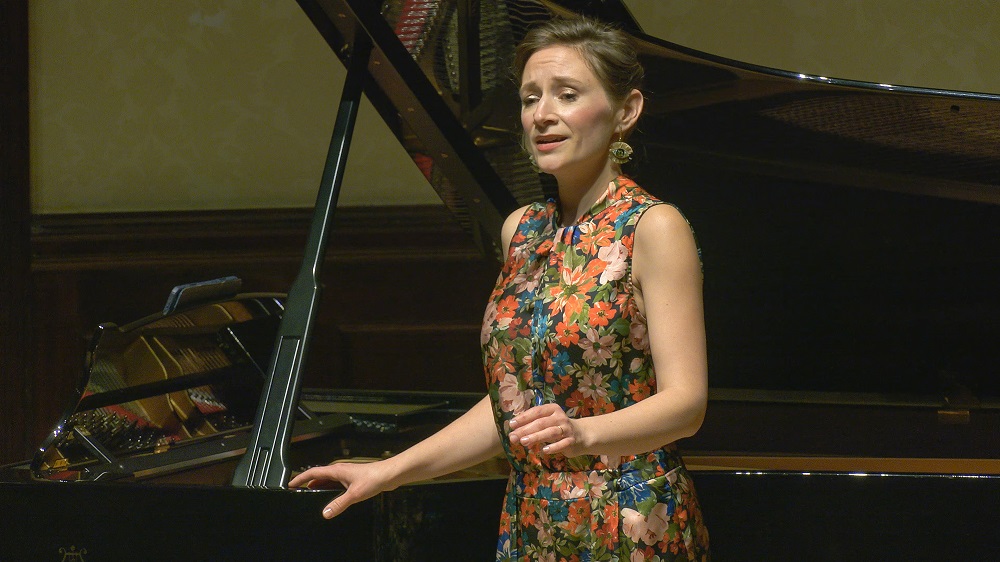Sabine Devieilhe, Mathieu Pordoy, Wigmore Hall review - enchantment in Mozart and Strauss | reviews, news & interviews
Sabine Devieilhe, Mathieu Pordoy, Wigmore Hall review - enchantment in Mozart and Strauss
Sabine Devieilhe, Mathieu Pordoy, Wigmore Hall review - enchantment in Mozart and Strauss
Leading French soprano shines beyond diva excess

Sabine Devieilhe, as with many other great sopranos, elicits much fan worship, with no less than three encores at her recent Wigmore Hall recital. In her native France, and in the rest of Europe, she has gathered ecstatic reviews for her performance and recording of a range of repertoire that stretches from the Baroque and Mozart to Richard Strauss, Debussy and Poulenc.
Accompanied by Mathieu Pordoy, she offered the rapt audience at the Wigmore an artfully designed programme of Mozart and Strauss, weaving her way through surprising segues and contrasts with seamless ease. On the face of it, these are two very different musical worlds, and yet these works have something in common, at a level that transcends mere musical chronology. Both composers were writing for sopranos that inspired them, and whom they loved. Without a hint of diva excess, Devieilhe navigated the sensual and sometimes erotic universe of these works with remarkable intelligence and sensitivity. Music for voice and piano is essentially a domestic mode: designed for the intimacy of the home rather than the pomp and grandeur of the concert hall. The French soprano’s natural grace suits this material, and, while teasing every nuance out of the words and musical form of the songs, communicating the heart of their message, she manages to avoid being too obviously theatrical.
Each note given its moment, and its place in a skilfully constructed phrase, she achieves a dazzling balance between technical brilliance and emotion. Her voice is naturally rounded, with a minimum of edge, even in the higher register and at full volume. There is unusual intelligence at work here, control that never just rests on formal elegance, but draws on the human voice’s capacity for moving an audience. Her command of coloratura, demonstrated in her widely-praised incarnation of the Queen of the Night in Mozart’s The Magic Flute (notably at Covent Garden in 2017) is exceptional, and there were moments in the recital when that almost otherworldly brio was evident, but never as if she were playing to the gallery, always in the service of the music. In Mozart’s “An Chloe”, closing the first half of the recital, a song that blatantly alludes to an erotic encounter, she managed high-register vibrato with wonderful sensitivity, a climax of such delicacy that the ecstasy was tangible.  Play is essential to both Mozart and Strauss, both of whom are as much at home with lightness and fun as they are with darker sentiments. In Pordoy, Devieilhe has the perfect partner, and the enjoyment they both experience – always underplayed, yet evident – is a joy to behold. That they’re regularly tweaking the content of the programme they’re touring – presenting works included in their latest album release – and not just repeating themselves night after night, is indicative of their desire to make it fresh, and that quality of sheer pleasure in being poised at the creative edge produces magic. Their complicity – and I’m using the word here more as complicité, the French word having none of the pejorative connotations of its English equivalent – imbued the music with something greater than just harmony: a dialogue in which mutual listening takes precedence over mere singing to piano accompaniment. When the pianist contributed a couple of short Mozart solo pieces, the soprano, turning her back on the audience, leant over the piano, quite still, listening. A deeply touching moment: it seemed as if she was not only nourishing the player with attention and energy, but also replenishing herself, as Pordoy gave himself to the music, before taking off again into another song.
Play is essential to both Mozart and Strauss, both of whom are as much at home with lightness and fun as they are with darker sentiments. In Pordoy, Devieilhe has the perfect partner, and the enjoyment they both experience – always underplayed, yet evident – is a joy to behold. That they’re regularly tweaking the content of the programme they’re touring – presenting works included in their latest album release – and not just repeating themselves night after night, is indicative of their desire to make it fresh, and that quality of sheer pleasure in being poised at the creative edge produces magic. Their complicity – and I’m using the word here more as complicité, the French word having none of the pejorative connotations of its English equivalent – imbued the music with something greater than just harmony: a dialogue in which mutual listening takes precedence over mere singing to piano accompaniment. When the pianist contributed a couple of short Mozart solo pieces, the soprano, turning her back on the audience, leant over the piano, quite still, listening. A deeply touching moment: it seemed as if she was not only nourishing the player with attention and energy, but also replenishing herself, as Pordoy gave himself to the music, before taking off again into another song.
There is a thrill to be sure from watching a diva take risks and produce emotional highs that can be spectacular. And yet, that pleasure becomes a spiritual experience when the singer manages to avoid excess, while still using her voice in a breath-taking way. Such temperance filters out the risk of self-importance that so often undermines the essence and soul of the music. Sabine Devieilhe shines as herself. She’s possessed of a capacity for enchantment – the heart of song at its origin. Self-effacing and yet absolutely present. The final song in the programme, “Kling”, a well-polished jewel from Richard Strauss, alluding to the voice’s capacity for transcendence, displayed the soprano’s exquisite command of vocal control and exuberance. Her three encores, culminating with a delightful “Solfeggio", one of four written by Mozart just before he married Constanze Weber, confirmed that she is one of the greatest sopranos of our time.
rating
Share this article
Subscribe to theartsdesk.com
Thank you for continuing to read our work on theartsdesk.com. For unlimited access to every article in its entirety, including our archive of more than 15,000 pieces, we're asking for £5 per month or £40 per year. We feel it's a very good deal, and hope you do too.
To take a subscription now simply click here.
And if you're looking for that extra gift for a friend or family member, why not treat them to a theartsdesk.com gift subscription?
more Classical music
 Remembering conductor Andrew Davis (1944-2024)
Fellow conductors, singers, instrumentalists and administrators recall a true Mensch
Remembering conductor Andrew Davis (1944-2024)
Fellow conductors, singers, instrumentalists and administrators recall a true Mensch
 Hallé, Wong, Bridgewater Hall, Manchester review - meeting a musical communicator
Drama and emotional power from a new principal conductor
Hallé, Wong, Bridgewater Hall, Manchester review - meeting a musical communicator
Drama and emotional power from a new principal conductor
 Guildhall School Gold Medal 2024, Barbican review - quirky-wonderful programme ending in an award
Ginastera spolights the harp, Nino Rota the double bass in dazzling performances
Guildhall School Gold Medal 2024, Barbican review - quirky-wonderful programme ending in an award
Ginastera spolights the harp, Nino Rota the double bass in dazzling performances
 Queyras, Philharmonia, Suzuki, RFH review - Romantic journeys
Japan's Bach maestro flourishes in fresh fields
Queyras, Philharmonia, Suzuki, RFH review - Romantic journeys
Japan's Bach maestro flourishes in fresh fields
 Classical CDs: Swans, hamlets and bossa nova
A promising young pianist's debut disc, plus Finnish mythology and a trio of neglected British composers
Classical CDs: Swans, hamlets and bossa nova
A promising young pianist's debut disc, plus Finnish mythology and a trio of neglected British composers
 Christian Pierre La Marca, Yaman Okur, St Martin-in-The-Fields review - engagingly subversive pairing falls short
A collaboration between a cellist and a breakdancer doesn't achieve lift off
Christian Pierre La Marca, Yaman Okur, St Martin-in-The-Fields review - engagingly subversive pairing falls short
A collaboration between a cellist and a breakdancer doesn't achieve lift off
 Ridout, Włoszczowska, Crawford, Lai, Posner, Wigmore Hall review - electrifying teamwork
High-voltage Mozart and Schoenberg, blended Brahms, in a fascinating programme
Ridout, Włoszczowska, Crawford, Lai, Posner, Wigmore Hall review - electrifying teamwork
High-voltage Mozart and Schoenberg, blended Brahms, in a fascinating programme
 Sabine Devieilhe, Mathieu Pordoy, Wigmore Hall review - enchantment in Mozart and Strauss
Leading French soprano shines beyond diva excess
Sabine Devieilhe, Mathieu Pordoy, Wigmore Hall review - enchantment in Mozart and Strauss
Leading French soprano shines beyond diva excess
 Špaček, BBC Philharmonic, Bihlmaier, Bridgewater Hall, Manchester review - three flavours of Vienna
Close attention, careful balancing, flowing phrasing and clear contrast
Špaček, BBC Philharmonic, Bihlmaier, Bridgewater Hall, Manchester review - three flavours of Vienna
Close attention, careful balancing, flowing phrasing and clear contrast
 Watts, BBC Symphony Orchestra and Chorus, Bignamini, Barbican review - blazing French masterpieces
Poulenc’s Gloria and Berlioz’s 'Symphonie fantastique' on fire
Watts, BBC Symphony Orchestra and Chorus, Bignamini, Barbican review - blazing French masterpieces
Poulenc’s Gloria and Berlioz’s 'Symphonie fantastique' on fire
 Bell, Perahia, ASMF Chamber Ensemble, Wigmore Hall review - joy in teamwork
A great pianist re-emerges in Schumann, but Beamish and Mendelssohn take the palm
Bell, Perahia, ASMF Chamber Ensemble, Wigmore Hall review - joy in teamwork
A great pianist re-emerges in Schumann, but Beamish and Mendelssohn take the palm
 First Persons: composers Colin Alexander and Héloïse Werner on fantasy in guided improvisation
On five new works allowing an element of freedom in the performance
First Persons: composers Colin Alexander and Héloïse Werner on fantasy in guided improvisation
On five new works allowing an element of freedom in the performance

Add comment